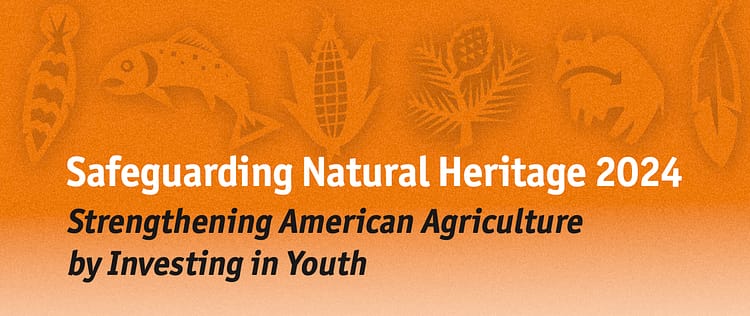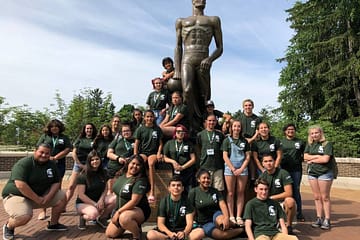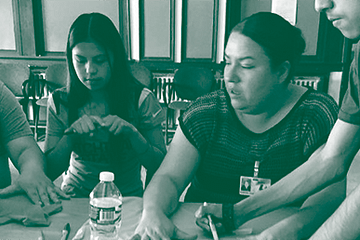Safeguarding Natural Heritage (SNH) is a free summer outreach program to help students explore careers in agricultural sciences within and outside the environs of a Tribal community.

As an SNH student, you’ll live on a college campus for 2 weeks and learn from university professors and USDA experts—plant and animal scientists, biotechnologists, veterinarians, wildlife biologists, administrative professionals, and others.
You’ll gain hands-on experience through labs, workshops, and field trips; participate in character- and team-building activities; and join in many other fun and educational events. The program also introduces you to sustainable agriculture and farming, with a view toward preserving your natural heritage and increasing awareness of the harm invasive species can do.
It’s a great chance to explore the many exciting career paths in agriculture—not only within your own Tribal community, but also at USDA.
In 2024, six schools are participating in SNH. Each school’s program focuses on a specific area of interest to its Nation’s agriculture, such as plant health, entomology, biotechnology, veterinary science, animal care, and agribusiness.
Read on to learn more about this year’s program, including dates, locations, and how to apply.
Diné College
June 9–21, 2024
SNH application deadline: May 30, 2024
Diné College, a designated 1994 land-grant institution, was established in 1968 as the first tribally controlled community college in the
United States. Based in Tsaile, AZ, Diné College is located 70 miles north of Window Rock, AZ, in the heart of the 27,000-square-mile Navajo Nation, and serves the Nation’s residents in New Mexico and Utah as well as Arizona.
As a post-secondary land-grant institution rooted in Navajo language and culture, the college awards degrees and certificates in areas important to the economic and social development of the Navajo Nation.
For more information or an application, contact:
Benita Litson
Director
Diné College Land Grant Office
P.O. Box C01
Tsaile, AZ 86556
(928) 724-6940
blitson@dinecollege.edu
www.dinecollege.edu
Navajo Technical University
June 3–14, 2024
SNH application deadline: April 26, 2024
Initially established in 1979 as the Navajo Skill Center in Crownpoint, NM, Navajo Technical University (NTU) is the Navajo Nation’s first university. A highly respected land-grant institution, NTU offers technical, vocational, and academic degrees, as well as community education, in a student-oriented, hands-on learning environment with state-of-the-art classroom equipment.
A highlight of the university’s curriculum is NTU’s Veterinary Technology program, which offers hands-on clinical and field experience as well as formal classroom instruction for students pursuing careers in animal health and other fields. NTU is the first Tribal college to develop a baccalaureate of science degree in Animal Science, providing students with many career options and the opportunity to apply to professional schools such as veterinary medicine.
For more information or an application, contact:
Sharie Begay
Office Manager
slbegay@navajotech.edu
Germaine Daye, D.V.M.
Veterinary Teaching Hospital and Land Grant Program Director
landgrant@navajotech.edu
Navajo Technical University
New Mexico State Highway 371 & NN9, P.O. Box 849
Crownpoint, NM 87313
(505) 387-7410 | www.navajotech.edu
University of North Carolina at Pembroke
July 8–19, 2024
SNH application deadline: May 31, 2024
The University of North Carolina at Pembroke (UNCP)—designated as “North Carolina’s historically American Indian University” by the
North Carolina Assembly and home to the Southeast American Indian Studies Program—is an ideal setting for SNH. Founded in 1887 to train teachers from the Lumbee Tribe, UNC Pembroke confers more undergraduate degrees on American Indians than any institution east of the Mississippi River. Between 1887 and 1952, the institution’s student body was all Indian.
From 1939 to 1953, the institution was the only State-supported, 4-year college for American Indians in the United States. Today, approximately 13.2 percent of the student body is American Indian, representing Native communities throughout North Carolina and beyond.
For more information or an application, contact:
Mary Beth Locklear
Office of Undergraduate Admissions
University of North Carolina at Pembroke
P.O. Box 1510
Pembroke, NC 28372
(910) 775-4020
mary.locklear@uncp.edu
www.uncp.edu
The College of Menominee Nation (CMN) began offering classes in January 1993 with 42 students enrolled in general education courses. As an institution of higher education chartered by the Menominee people, this land-grant college infuses education with American Indian culture, preparing students for a multicultural world. CMN’s Department of Continuing Education is committed to providing training and educational opportunities using the circle of life model, which equips and empowers the community—from youth to elders—to take ownership and responsibility to improve their lives.
For more information or an application, contact:
Matilda Peters
Youth Program Extension Coordinator
College of Menominee Nation, Keshena Campus
N172 Highway 47/55
P.O. Box 1179
Keshena, WI 54135
(715) 799-5600, ext. 3251
mpeters@menominee.edu
www.menominee.edu
Fond du Lac Tribal and Community College
June 10–21, 2024
SNH application deadline: June 1, 2024
Fond du Lac Tribal and Community College has a mission of providing education to the public through a union of cultures. A unique partnership between Fond du Lac Band of Lake Superior Chippewa and Minnesota State Colleges and Universities offers all students the opportunity to learn in a comfortable and diverse environment.
Founded in 1987, the College offers 2-year associate degrees and certificates across a wide range of program areas, including: law enforcement, human services, nursing, business, electric utility technology, clean energy, American Indian studies, child development,
geospatial technologies, and environmental science. Fond du Lac Tribal and Community College is accredited by the World Indigenous Nations Higher Education Consortium as well as the Higher Learning Commission of the North Central Association of Colleges and Schools.
For more information or an application, contact:
Joseph Bruce
Youth Education Outreach Coordinator
Fond du Lac Tribal and Community College
2101 14th Street
Cloquet, MN 55720
(218) 879-0862
joseph.bruce@fdltcc.edu
www.fdltcc.edu
Salish Kootenai College
June 13-21, 2024
SNH application deadline: May 31, 2024
Salish Kootenai College (SKC) is a Tribal College founded in 1976 whose mission is to provide quality post-secondary educational opportunities for Native Americans, locally and throughout the United States. SKC seeks to promote community and individual development and perpetuate the cultures of the Confederated Tribes of the Flathead Nation.
The college offers an associate degree program in natural resources; bachelor’s degree programs in forestry, fire science, hydrology, and wildlife; and as of fall 2021, a master’s degree program in natural resources management.
The Natural Resources Department supports individual and community empowerment through meaningful partnerships that take many forms, including enhancing student-community research internship capacity. SKC also offers undergraduate degrees in a number of other fields, including: nursing, education, psychology, business, information technology, Native American studies, Tribal Governance and Administration, and Tribal Historic Preservation.
For more information or an application, contact:
Virgil Dupuis
Department Director, Salish Kootenai College Extension
Salish Kootenai College
58138 Highway 93, Pablo, MT 59855
(406) 275-4800, ext. 4899
virgil_dupuis@skc.edu
How To Apply
Although SNH is focused on students between the ages of 14 and 17, students slightly younger or older may also be eligible to apply, depending on the school. Most schools require the following materials:
Complete application (including emergency contact and related information)
Short essay (your general interests, hobbies, future plans, and specific interest in the program)
Letters of recommendation
High school transcript
Brief biography (no more than 250 words)
For guidance on specific requirements, contact the school of your choice directly.
Costs
The SNH program is free. USDA’s Animal and Plant Health Inspection Service
(APHIS) covers the cost of tuition, room and board, and laboratory supplies.
You are only responsible for the cost of traveling to the university campus on
opening day and returning home at the conclusion of the program.
For More Information
If you have questions about the SNH program, contact APHIS’ Office of the
National Tribal Liaison:
Terry W. Clark, D.V.M. Andrew Hubble
Director Assistant Director
(301) 440-4388 (202) 774-4612
terry.w.clark@usda.gov andrew.w.hubble@usda.gov
Carl Etsitty
Assistant Director
(970) 494-7573
carl.etsitty@usda.gov


0 Comments